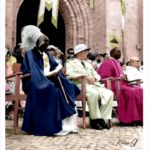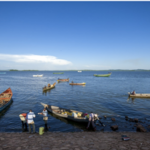The Fall Of The Reign Of Rutarindwa
As Rwabugiri grew older, he became concerned with providing for an orderly succession that would guarantee the gains in power and territory he had made. Hoping to break the pattern of children being installed as bami, he ordered that his heir, Rutarindwa, a young man in his twenties, rule together with him during the last years of his life. Rutarindwa was enthroned as co-regnant in December 1889, taking the reign name of Mibambwe : (Royal names succeeded one another as part of a cycle of four “reign names” in a prescribed fashion: Mutara, Kigeri, Mibambwe, and Yuhi; in theory, in alternate cycles Cyilima was substituted for Mutara, though this was not followed with Musinga’s succession).
Since Rwabugiri had killed Rutarindwa’s own mother some years before, he now named another wife, Kanjogera, to serve as Rutarindwa’s queen mother. According to tradition, substitutes chosen to act as queen mothers had to be of the same lineage as the natural mother of the mwami and could not have sons of their own eligible to rule. In addition, a more recent restriction prohibited women of the Bakagara lineage of the Bega clan from acting as queen mothers because some members of the lineage had been permitted to learn part of the ubwiru (the esoteric royal code).
In appointing Kanjogera, Rwabugiri ignored all these stipulations. She was a Mwega (singular of Bega) of the Bakagara lineage, while Rutarindwa’s own mother had been of the Bakono clan. She also had a young son, Musinga, fathered by Rwabugiri and so eligible to succeed.
Some notables, including some biru whose advice was being disregarded, accused Rwabugiri of being blinded by his great love for Kanjogera, who was his favorite wife. But Rwabugiri’s head probably played as much a part as his heart in determining his choice. By naming a Mwega queen mother for a son related to the Bakono, he could associate the powerful Bega with the throne without giving them control over it. Rwabugiri died suddenly in late 1895, just as his troops were embarking on an expedition against Bushi on the west side of Lake Kivu. Despite rumors that the impatient Bega had poisoned the great warrior, he actually died from illness. Rutarindwa took power with apparent ease, unaware that Kanjogera and her brothers, Kabare and Ruhinankiko, had already begun secretly to plot his downfall.
Rutarindwa had been in power about six months when his authority was challenged openly, not by the Bega but by a Belgian officer named Georges Sandrart. Lieutenant Sandrart, who had been quelling a mutiny of soldiers in the eastern part of the Congo Free State, had crossed with several hundred Congolese troops into the southwestern corner of Rwanda. After establishing a fortified camp on the hill Shangi on the shores of Lake Kivu, Sandrart had tried to win the allegiance of local notables to the Congo State. Rutarindwa sent several thousand of his best warriors under the experienced commanders Bisangwa and Muhigirwa against the invaders. Armed with spears and bows, the Rwandans charged unsuccessfully: the Congolese had the advantage of superior position and more efficient weapons. After his troops were driven back, Bisangwa supposedly dispatched a messenger to Court, asking: “When one is defeated abroad, one returns to his own country; when one is beaten at home, where does one go then?” The Rwandans attacked twice more before Sandrart killed Bisangwa with a bullet through the head and thus dispersed the Rwandan troops.
Rwandan warriors had once before been defeated by an enemy armed with guns. The German explorer Count G. A. von GÖTZEN, the first European to travel through Rwanda, had turned back a small force sent against him by Rwabugiri in 1894. But this defeat had caused little stir because so few were killed and because Rwabugiri had refused to acknowledge the attack as an official expedition. At Shangi, Rutarindwa had been committed to expelling the invaders. But the hundred or so warriors who fell there included some of the best of the kingdom. The battle quickly became known as a disaster that symbolized the supremacy of European weapons over Rwandan ones and, by implication, European power over Rwandan power. This demonstration of weakness gave rise to such tales as the one that recounted that Sandrart had not even moved from his chair when the Rwandans had attacked but had merely motioned to his wife to halt the assault. Sandrart, of course, had had no wife with him and, from the Belgian point of view, his victory resulted from courageous effort rather than casual nonchalance; nonetheless, the tale indicates how unequal the Rwandans thought the contest hadbeen.
Several weeks after the Shangi battle, a German officer from the newly established station at Bujumbura, Burundi, arrived to notify Sandrart that he was violating German territory as defined by the Congolese—German Agreement of 1884. Rather than do battle, Sandrart withdrew from Rwanda. The German officer returned directly to Bujumbura without passing by the Court to explain why he had expelled Sandrart and his troops.Although the Belgian officer had left, the impression of the weakness of the Court and its armies remained and encouraged the Bega in their plot to install Musinga as mwami. Bisangwa had been the most powerful of three notables charged by Rwabugiri with protecting Rutarindwa. His death made it easier for the Bega to dispose of the other two, Mugugu and Sehene. Before being killed, Mugugu sent a warning to Rutarindwa that “they are cutting off your arms and you do not realize it.”Despite such warnings, Rutarindwa took no decisive action as the Bega gradually isolated him.
By December 1896 the Bega were confident of their strength. Rutarindwa had just moved the Court to a new location on the hill named Rucunshu, in the region of Marangara, not far from the center of the kingdom. While constructing his residence, Rutarindwa was living in an ordinary house, more modest and less easily defended than a royal residence with its large and sturdily built enclosure. Taking advantage of this temporary weakness, Kabare gave the signal for the attack one day in the late afternoon. The two sides were about evenly matched, and they fought fiercely. The sudden arrival of reinforcements who sided with the Bega turned the battle in their favor. Kabare seized his nephew Musinga, a boy of twelve or thirteen years old, and lifted him in the air, proclaiming him as the true mwami. As the attackers acclaimed Musinga, increasing numbers of Rutarindwa’s supporters deserted him. The legitimate heir, seeing no hope of escape, killed himself. His relatives and loyal followers then killed each other or committed suicide. At the last, one of them set fire to the house in which they had taken refuge and where many of the precious possessions of the dynasty had been stored. Apparently destroyed at this time was Karinga, the great drum that symbolized the mwami as ruler of Rwanda. According to tradition, no mwami could legitimately rule without it. When the damage was assessed after the battle, and the loss of Karinga was reported to Kabare, the pragmatic plotter is said to have responded, “We have the mwami; we can make the drum.”
https://uk.amateka.net/the-fall-of-the-reign-of-rutarindwa/https://uk.amateka.net/wp-content/uploads/2021/04/mariage_roi.jpghttps://uk.amateka.net/wp-content/uploads/2021/04/mariage_roi-150x150.jpgHistory of kingsAs Rwabugiri grew older, he became concerned with providing for an orderly succession that would guarantee the gains in power and territory he had made. Hoping to break the pattern of children being installed as bami, he ordered that his heir, Rutarindwa, a young man in his twenties, rule...BarataBarata rpierre@ikaze.netAdministratorAMATEKA | HISTORY OF RWANDA




